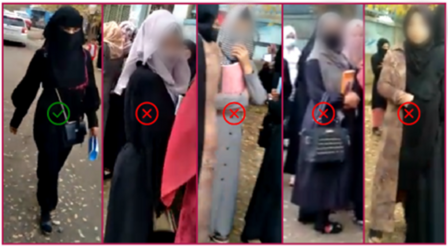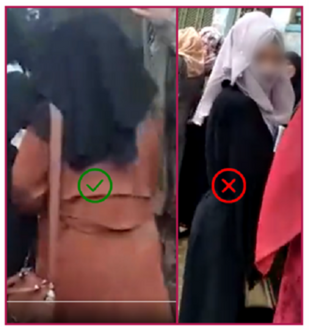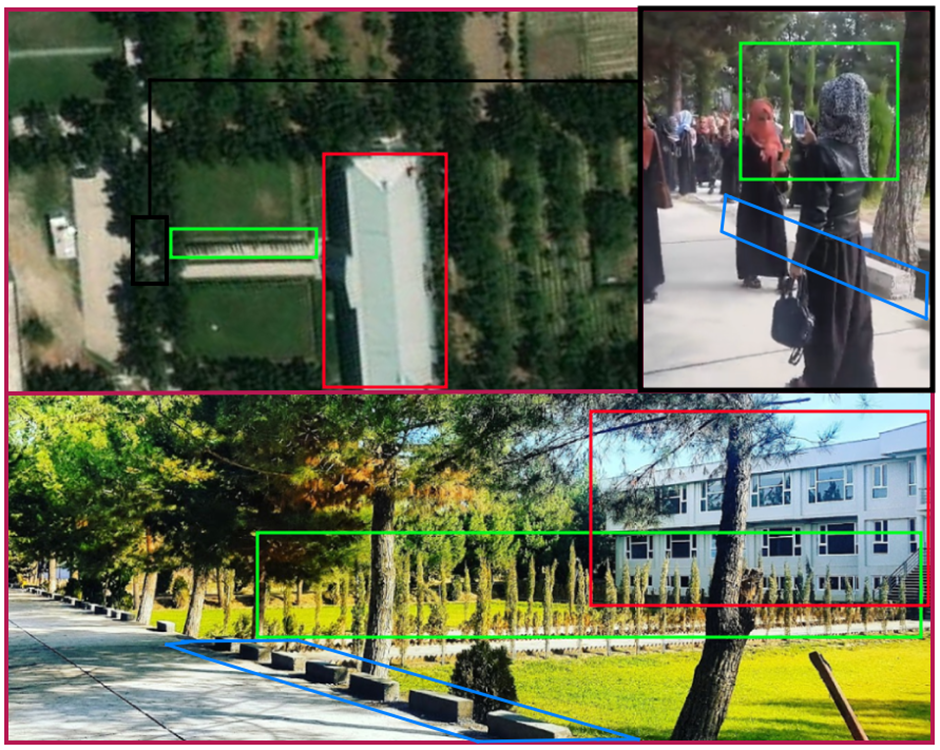On October 30, 2022, a large number of female students were denied entrance to Badakhshan University, in the city of Fayzabad, by a group of Taliban.
According to an audio file sent by one of the students to Rukhshana, a media company focused on women’s issues in Afghanistan, members of the department enforced this measure for the Propagation of Virtue and Prevention of Vice. The unnamed student explained that although the Taliban claimed they were only allowing female students with an Islamic hijab to go through the gates, various female students outside were following the Islamic guidelines. According to the student, the Taliban asserted that “the mask cannot be used as a hijab”, “[it] is produced by foreigners, you must wear burqas.”
As a large group of female students gathered outside the university gates, some were recorded hitting and kicking the gates, demanding to be let in. A Taliban member wearing military clothes then came out and attempted to strike the gathered students with what appeared to be a small whip or a baton. Below (starting on the left) is the sequence of events with a photo of the students hitting the doors and the subsequent Taliban reaction.
Figure: Sequence of events at the Badakhshan University gates. Female students hit the gates demanding to enter (left), and the subsequent Taliban reaction by hitting them indiscriminately.
The same scene was [WARNING: GRAPHIC] filmed by a different student from another angle. The footage showed that the violence towards the women was not an isolated incident. A few seconds later, the same Taliban member swung again at a group of female students approaching the gate. In the film, he can be heard telling other Taliban members at the gate to take the phones from the women. AW investigators found no evidence or claims from students that Taliban officials seized their phones. Therefore, it is not clear if the Taliban followed the orders.
In a video shared by ABN Pashto, an Afghan news agency with 138k followers on Facebook, a female student narrated the situation at the Badakhshan University gates. She confirmed that officials from the Ministry of Propagation of Virtue and Prevention of Vice were stopping women at the gates and not allowing them to go through without approving their face covering.
AW investigators analysed the various pieces of footage and can confirm that only female students wearing black niqabs were allowed through the university gates. Students wearing colourful head coverings, face masks, or no coverings were not allowed to go through to attend lessons. Below is a compilation of various photos of female students at the gates of Badakhshan University. The first photo on the left belongs to a student that entered the university. The others show various female students who were denied entry due to their choice of face covering.

Figure: Photos illustrating the clothing that the Taliban deemed acceptable (left) and the clothing that was not acceptable for female students to enter Badakhshan University.
Although most female students allowed through the gate were wearing a complete all-black outfit, the Taliban were seen [WARNING: GRAPHIC] allowing women wearing colourful clothes, providing they wore a black niqab, which covered their faces. Below is the comparison between a student allowed in (left) and a student kept outside (right). The woman on the left had a black niqab, whilst the woman on the right had a non-black scarf covering her face. Both wore similar degrees of face coverings.

Figure: Comparison between a female student wearing a black niqab that was allowed in the gate (left) despite wearing colourful clothes and a student not allowed in for not wearing a black niqab to cover her face.
According to an article published by Azadi, the Head of the Taliban administration in Badakhshan, Shir Mohammad, claimed that the decision did not come from his department but from the Badakhshan University committee. Mohammad stated, “After we heard about the demonstration, we sent two of our policemen there to advise and inform. We also sent the head of policemen to advise them to stop violent demonstrations and solve any problems that have been found by the university or by anyone else.” An unnamed student quoted by the news agency claimed they were eventually let in and allowed to attend their lessons.
AW investigators could not confirm the presence of police officers at Badakhshan University gates. However, a [WARNING: GRAPHIC] video shared by Azadi Radio provides evidence that the gates were eventually fully open, and the students were let in.
Once inside the university grounds, a large group of female students marched and protested against the new measure. Below is a figure showing the geolocation of the women protesting. On the top left is a satellite image highlighting, in black, the group’s location in the photo on the right. At the bottom is a photo from Google Maps submitted in 2018, where it is possible to see the resemblance between the area and the location of the protesting group.
Figure: Geolocation of the group of female students (top right) protesting inside the Badakhshan University grounds. [37.103065, 70.526008]
AW investigators can confirm that the majority of female students attending the protest inside the university were not seen wearing a black niqab. This provides additional evidence of the decision to allow the students to enter the university, even if they did not adhere to the definition of an Islamic hijab enforced by officials from the Ministry for the Propagation of Virtue and Prevention of Vice.
AW investigators contacted local sources in Badakhshan to gather more information about this incident. Civil society activists, journalists, and residents close to Badakhshan University claimed that the Taliban had several meetings with the female students after the protest. As a result, the women allegedly agreed that they would observe the imposed hijab rules, whilst the Taliban decided not to attempt to stop them from accessing the university. AW investigators could not visually confirm that the female students started adhering to the Taliban’s version of the appropriate Islamic hijab in the days following the protest.
Ultimately, AW sources in Badakhshan foresaw that the agreement between the protesting students and the Taliban would be short-lived and that more protests were expected.




